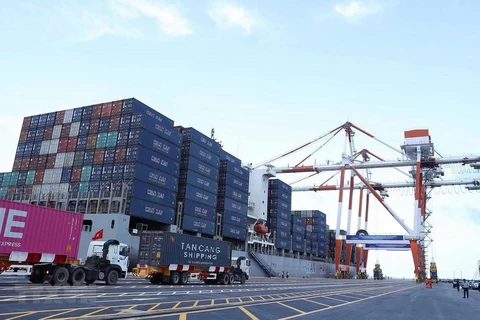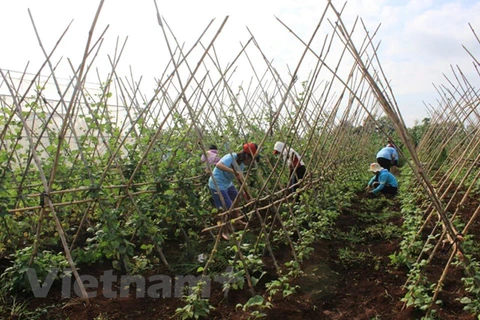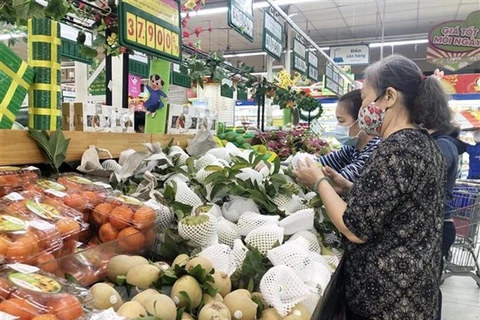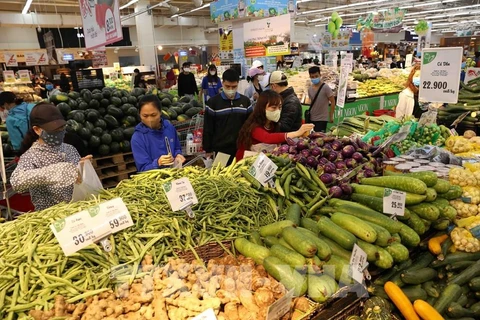Hanoi (VNS/VNA) - The COVID-19 pandemic has impacted economies and commodity markets globally, including Vietnam, and domestic prices will continue to fluctuate and be more closely linked to the fluctuations of raw material and fuel prices on the world market.
At the 10th session, the 14th National Assembly set a target of an average consumer price index (CPI) growth rate of about 4 percent.
Economists forecast that there were many factors to make the consumer price index (CPI) increase this year.
Notably, the prices of many types of raw materials and fuels on the world market are expected to hike again when the COVID-19 pandemic in the world is gradually controlled, COVID-19 vaccines are distributed on a large scale and production, trade and international exchanges recover.
Dr Nguyen Ngoc Tuyen from the Academy of Finance predicted that the price of many essential goods would fluctuate this year, so the CPI would be higher than last year, but the average for the whole year would be below 4 percent, the target set by the National Assembly.
Nguyen Anh Tuan, Director of the Price Management Department under the Ministry of Finance, said there would be some factors that adversely affect the price situation this year such as fuel and petroleum product prices had changed continuously.
Essential goods, including pork, could also be impacted if the disease was not controlled well, he said.
However, in the opposite direction, amid many factors related to the pandemic and the aggregate demand of the economy unlikely to recover to levels seen pre-pandemic, the market prices of essential goods are not expected to have large fluctuations in general.
Therefore, Tuan said it was necessary to forecast both difficulties and advantages to prepare appropriate measures.
Authorities plan to strengthen management and inspection of the observance of the law on prices and of compliance with the laws on taxes and fees and to strictly manage the listing of prices and selling at listed prices of items with high demand during holidays.
In addition, authorities will closely monitor developments and implement solutions to balance supply and demand to stabilise the market and prices.
At the same time, there should be specific operation solutions for commodities such as petroleum.
Specifically, the Ministry of Industry and Trade must work with the Ministry of Finance to control the price of petroleum, taking into account market factors and working with the petrol price stabilisation fund, he said.
For electricity products, it would be necessary to carefully evaluate the cost factor affecting the price to consider the impact on electricity prices, Tuan noted./.
At the 10th session, the 14th National Assembly set a target of an average consumer price index (CPI) growth rate of about 4 percent.
Economists forecast that there were many factors to make the consumer price index (CPI) increase this year.
Notably, the prices of many types of raw materials and fuels on the world market are expected to hike again when the COVID-19 pandemic in the world is gradually controlled, COVID-19 vaccines are distributed on a large scale and production, trade and international exchanges recover.
Dr Nguyen Ngoc Tuyen from the Academy of Finance predicted that the price of many essential goods would fluctuate this year, so the CPI would be higher than last year, but the average for the whole year would be below 4 percent, the target set by the National Assembly.
Nguyen Anh Tuan, Director of the Price Management Department under the Ministry of Finance, said there would be some factors that adversely affect the price situation this year such as fuel and petroleum product prices had changed continuously.
Essential goods, including pork, could also be impacted if the disease was not controlled well, he said.
However, in the opposite direction, amid many factors related to the pandemic and the aggregate demand of the economy unlikely to recover to levels seen pre-pandemic, the market prices of essential goods are not expected to have large fluctuations in general.
Therefore, Tuan said it was necessary to forecast both difficulties and advantages to prepare appropriate measures.
Authorities plan to strengthen management and inspection of the observance of the law on prices and of compliance with the laws on taxes and fees and to strictly manage the listing of prices and selling at listed prices of items with high demand during holidays.
In addition, authorities will closely monitor developments and implement solutions to balance supply and demand to stabilise the market and prices.
At the same time, there should be specific operation solutions for commodities such as petroleum.
Specifically, the Ministry of Industry and Trade must work with the Ministry of Finance to control the price of petroleum, taking into account market factors and working with the petrol price stabilisation fund, he said.
For electricity products, it would be necessary to carefully evaluate the cost factor affecting the price to consider the impact on electricity prices, Tuan noted./.
VNA

























